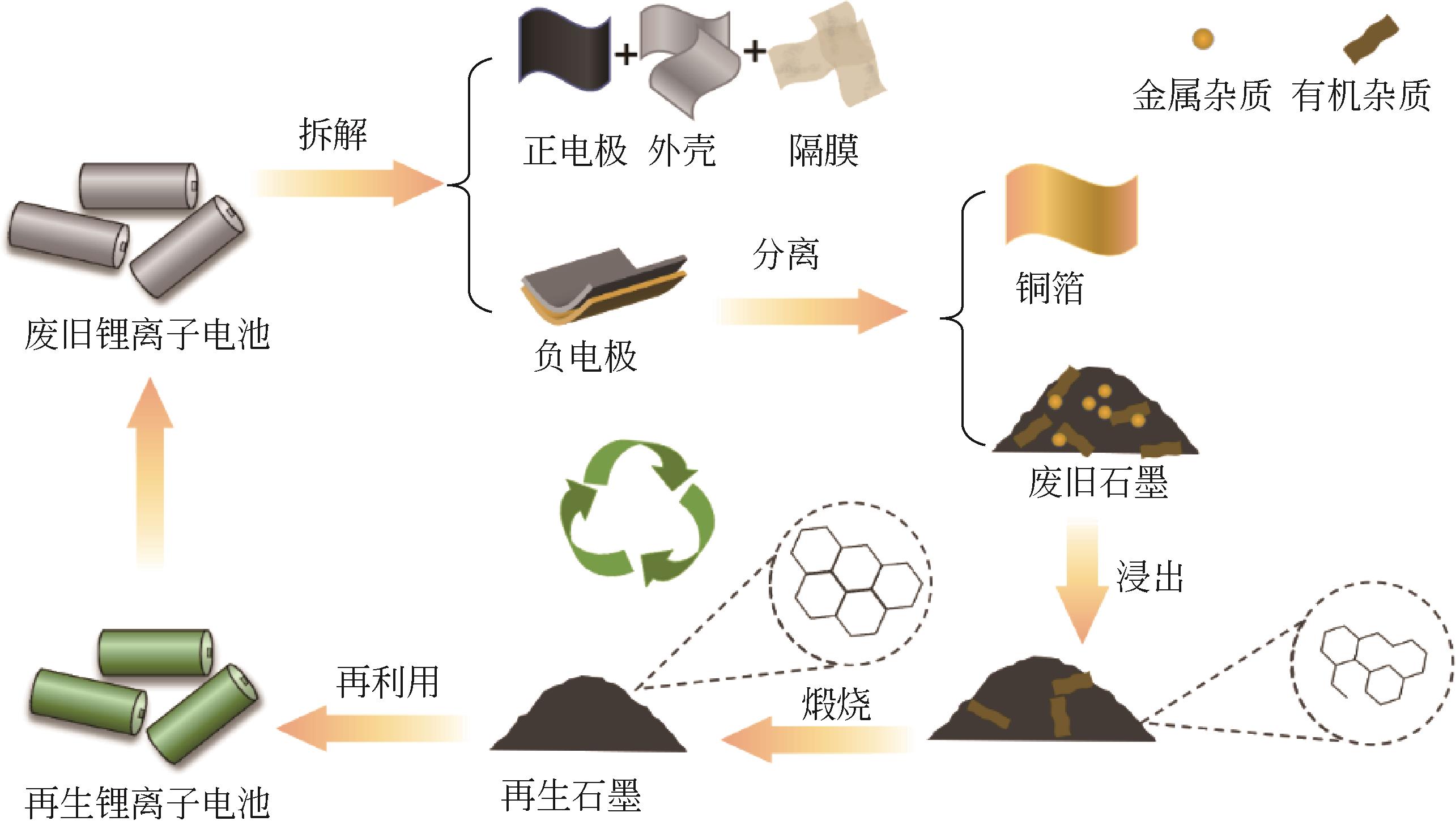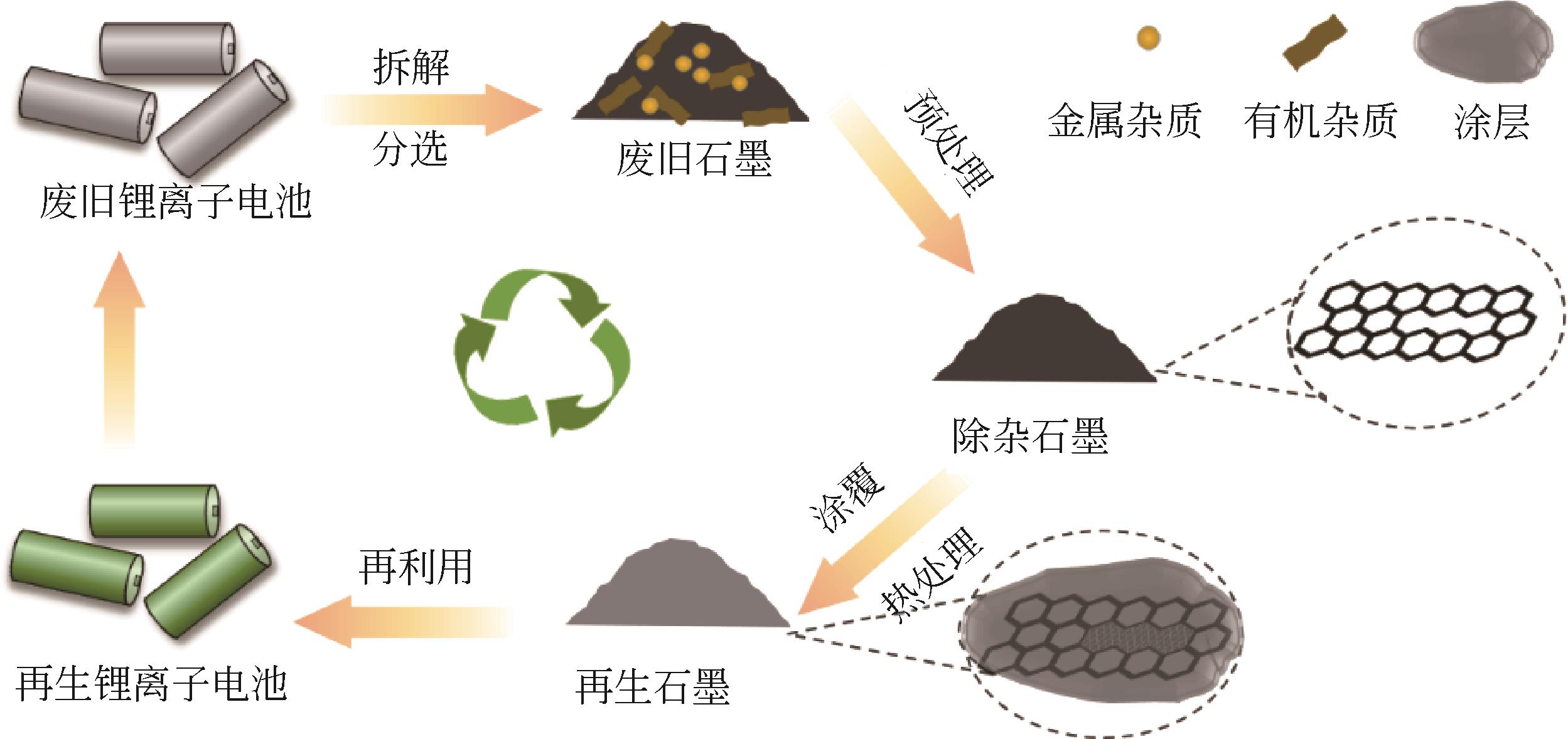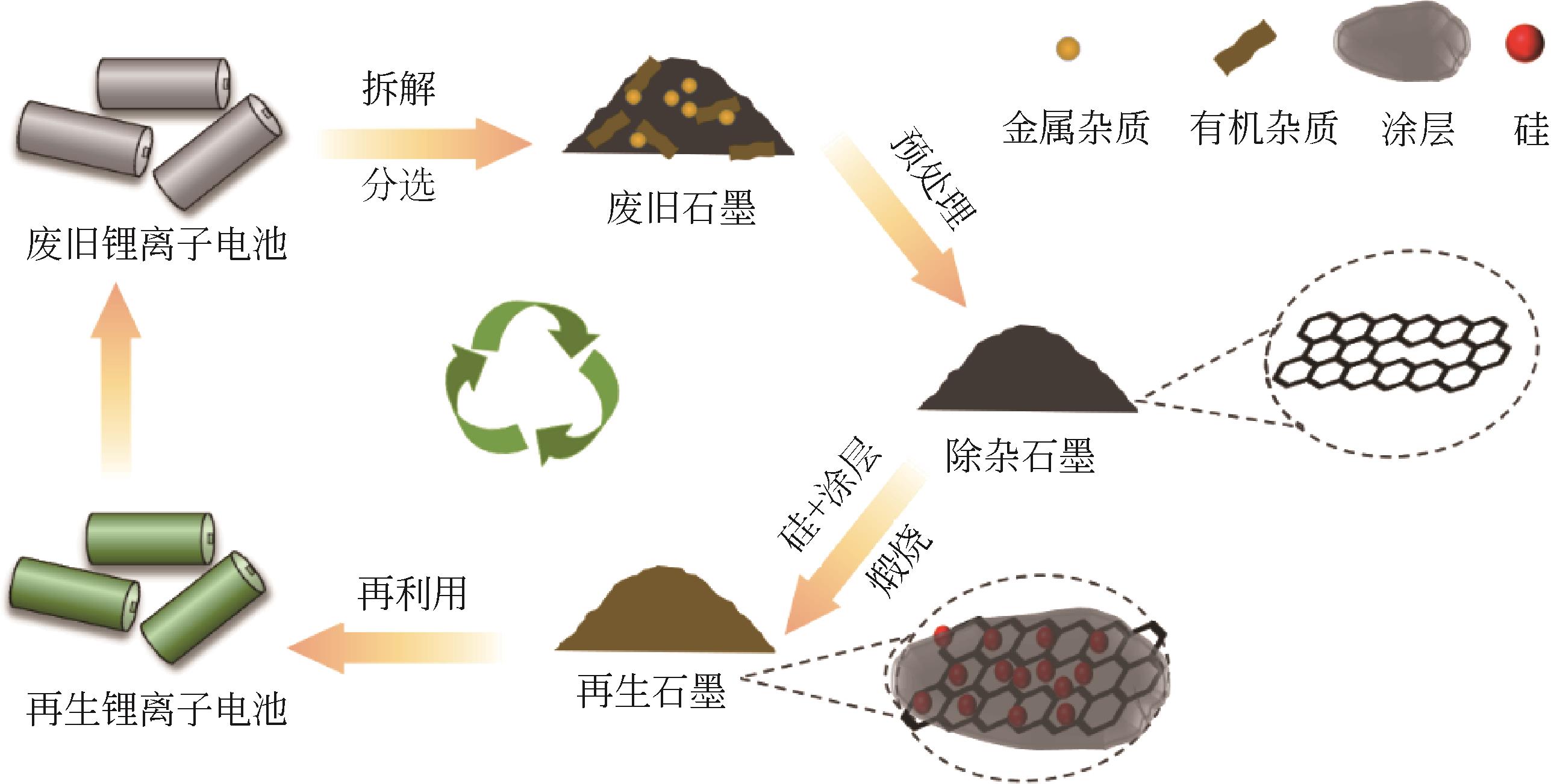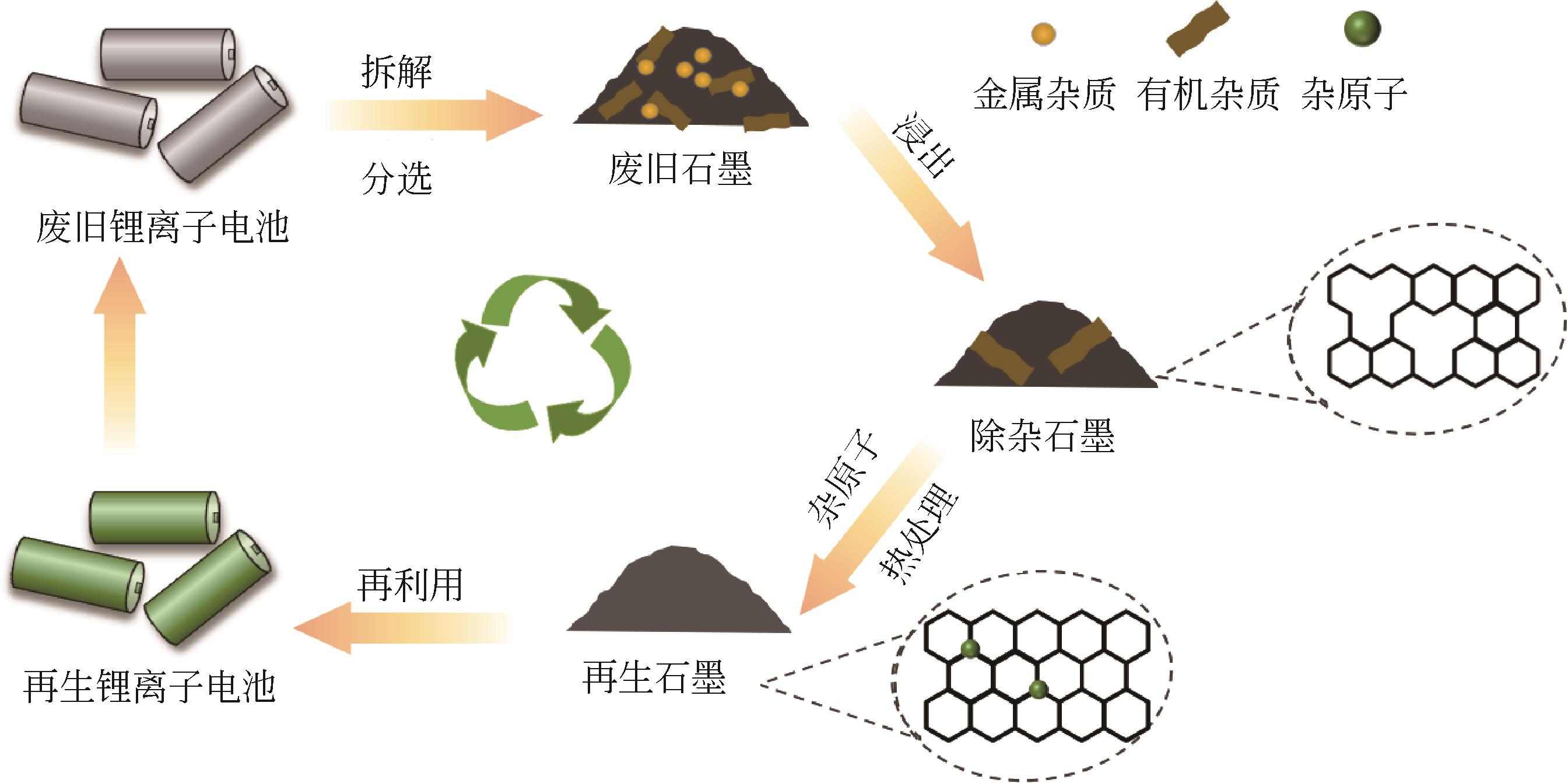Chemical Industry and Engineering Progress ›› 2024, Vol. 43 ›› Issue (3): 1524-1534.DOI: 10.16085/j.issn.1000-6613.2023-0419
• Resources and environmental engineering • Previous Articles
Review on recycling of graphite anode from spent lithium-ion batteries
CHU Zhenpu1( ), CHEN Yumeng2,3(
), CHEN Yumeng2,3( ), LI Junguo3, SUN Qingxuan2, LIU Ke1,3,4(
), LI Junguo3, SUN Qingxuan2, LIU Ke1,3,4( )
)
- 1.Department of Chemistry, Southern University of Science and Technology, Shenzhen 518055, Guangdong, China
2.School of Mechanical and Electrical Engineering, Shenzhen Polytechnic, Shenzhen 518055, Guangdong, China
3.School of Innovation and Entrepreneurship, Southern University of Science and Technology, Shenzhen 518055, Guangdong, China
4.Guangdong Provincial Key Laboratory of Catalysis, Southern University of Science and Technology, Shenzhen 518055, Guangdong, China
-
Received:2023-03-20Revised:2023-05-30Online:2024-04-11Published:2024-03-10 -
Contact:CHEN Yumeng, LIU Ke
废旧锂离子电池负极石墨循环再生的研究进展
楚振普1( ), 陈禹蒙2,3(
), 陈禹蒙2,3( ), 李俊国3, 孙庆轩2, 刘科1,3,4(
), 李俊国3, 孙庆轩2, 刘科1,3,4( )
)
- 1.南方科技大学化学系,广东 深圳 518055
2.深圳职业技术学院机电工程学院,广东 深圳 518055
3.南方科技大学创新创业学院,广东 深圳 518055
4.广东省催化重点实验室,广东 深圳 518055
-
通讯作者:陈禹蒙,刘科 -
作者简介:楚振普(1999—),男,硕士研究生,研究方向为废旧锂离子电池资源化回收。E-mail:12232778@mail.sustech.edu.cn。 -
基金资助:深圳市科技计划(KQTD20180411143418361);广东省催化重点实验室(2020B121201002)
CLC Number:
Cite this article
CHU Zhenpu, CHEN Yumeng, LI Junguo, SUN Qingxuan, LIU Ke. Review on recycling of graphite anode from spent lithium-ion batteries[J]. Chemical Industry and Engineering Progress, 2024, 43(3): 1524-1534.
楚振普, 陈禹蒙, 李俊国, 孙庆轩, 刘科. 废旧锂离子电池负极石墨循环再生的研究进展[J]. 化工进展, 2024, 43(3): 1524-1534.
share this article
Add to citation manager EndNote|Ris|BibTeX
URL: https://hgjz.cip.com.cn/EN/10.16085/j.issn.1000-6613.2023-0419
| 工艺 | 容量 /mAh·g-1 | 首次充电比容量 /mAh·g-1 | 首次库仑效率 /% | 容量保持率 /% | 参考文献 |
|---|---|---|---|---|---|
①硫酸固化-酸浸法 ②Ar气氛,1500℃煅烧2h | 349(0.1C) | 88.3 | 98.8 | [ | |
①N2气氛,1400℃煅烧4h ②超声振动和筛分 | 360.8 | 几乎100(100次循环,1C) | [ | ||
①500℃高温热处理 ②0.1mol/L酸性溶液浸出一夜 ③N2气氛,3000℃煅烧6h | 352.5 | 97.3(1000次循环); 87.88(1600次循环) | [ | ||
①35℃下浸泡在2mol/L硫酸中过夜 ②60℃下干燥12h ③酸浸石墨与硝酸钴加入适量的醇中并搅拌直至醇干燥 ④N2气氛,900℃煅烧4h | 358(1次循环,0.1C); 245.4(500次循环,1C) | [ | |||
①硫酸固化酸浸处理 ②微波煅烧600~900℃,1~3h | 354.1(0.1C) | 83.4 | 98.3(60次循环,0.1C) | [ | |
①95℃下,200g/L硫酸溶液中液固比(L/S)为1mL∶5g,浸出4h ②Ar气氛,900℃煅烧2h | 358.1(0.1C) | 98.8(100次循环) | [ | ||
①加入硫酸盐、氟化钠250℃低温焙烧 ②水浸 | 85.71 | 91.2(400次循环) | [ | ||
①110℃真空干燥箱干燥10h ②与不同质量比的NH4F粉末手动搅拌混合2h ③空气气氛,200℃煅烧60min | 340.9 | 92.13 | 96(100次循环,1C) 96(400次循环,1C/1C,全电池) | [ |
| 工艺 | 容量 /mAh·g-1 | 首次充电比容量 /mAh·g-1 | 首次库仑效率 /% | 容量保持率 /% | 参考文献 |
|---|---|---|---|---|---|
①硫酸固化-酸浸法 ②Ar气氛,1500℃煅烧2h | 349(0.1C) | 88.3 | 98.8 | [ | |
①N2气氛,1400℃煅烧4h ②超声振动和筛分 | 360.8 | 几乎100(100次循环,1C) | [ | ||
①500℃高温热处理 ②0.1mol/L酸性溶液浸出一夜 ③N2气氛,3000℃煅烧6h | 352.5 | 97.3(1000次循环); 87.88(1600次循环) | [ | ||
①35℃下浸泡在2mol/L硫酸中过夜 ②60℃下干燥12h ③酸浸石墨与硝酸钴加入适量的醇中并搅拌直至醇干燥 ④N2气氛,900℃煅烧4h | 358(1次循环,0.1C); 245.4(500次循环,1C) | [ | |||
①硫酸固化酸浸处理 ②微波煅烧600~900℃,1~3h | 354.1(0.1C) | 83.4 | 98.3(60次循环,0.1C) | [ | |
①95℃下,200g/L硫酸溶液中液固比(L/S)为1mL∶5g,浸出4h ②Ar气氛,900℃煅烧2h | 358.1(0.1C) | 98.8(100次循环) | [ | ||
①加入硫酸盐、氟化钠250℃低温焙烧 ②水浸 | 85.71 | 91.2(400次循环) | [ | ||
①110℃真空干燥箱干燥10h ②与不同质量比的NH4F粉末手动搅拌混合2h ③空气气氛,200℃煅烧60min | 340.9 | 92.13 | 96(100次循环,1C) 96(400次循环,1C/1C,全电池) | [ |
| 1 | TARASCON J M, ARMAND M. Issues and challenges facing rechargeable lithium batteries[J]. Nature, 2001, 414: 359-367. |
| 2 | DUNN Jennifer B, LINDA Gaines, JOHN Sullivan, et al. Impact of recycling on cradle-to-gate energy consumption and greenhouse gas emissions of automotive lithium-ion batteries[J]. Environmental Science & Technology, 2012, 46(22): 12704-12710. |
| 3 | LI Li, FAN Ersha, GUAN Yibiao, et al. Sustainable recovery of cathode materials from spent lithium-ion batteries using lactic acid leaching system[J]. ACS Sustainable Chemistry & Engineering, 2017, 5(6): 5224-5233. |
| 4 | XU Yanan, DONG Yanying, HAN Xiao, et al. Application for simply recovered LiCoO2 material as a high-performance candidate for supercapacitor in aqueous system[J]. ACS Sustainable Chemistry & Engineering, 2015, 3(10): 2435-2442. |
| 5 | PILLOT C. The rechargeable battery market and main trends 2013—2025, Proceedings of the 31st international battery seminar & exhibit[Z]. EnergyAvicenne. Shenzhen, China. 2014. |
| 6 | JIANG Jian, ZHU Jianhui, AI Wei, et al. Evolution of disposable bamboo chopsticks into uniform carbon fibers: A smart strategy to fabricate sustainable anodes for Li-ion batteries[J]. Energy & Environmental Science, 2014, 7(8): 2670-2679. |
| 7 | NIE Hehe, XU Long, SONG Dawei, et al. LiCoO2: Recycling from spent batteries and regeneration with solid state synthesis[J]. Green Chemistry, 2015, 17(2): 1276-1280. |
| 8 | SCHIAVI Pier Giorgio, FARINA Luca, ZANONI Robertino, et al. Electrochemical synthesis of nanowire anodes from spent lithium ion batteries[J]. Electrochimica Acta, 2019, 319: 481-489. |
| 9 | FAN Ersha, LI Li, WANG Zhenpo, et al. Sustainable recycling technology for Li-ion batteries and beyond: Challenges and future prospects[J]. Chemical Reviews, 2020, 120(14): 7020-7063. |
| 10 | NATARAJAN Subramanian, ARAVINDAN Vanchiappan. An urgent call to spent LIB recycling: Whys and wherefores for graphite recovery[J]. Advanced Energy Materials, 2020, 10(37): 2002238. |
| 11 | LIU Kui, YANG Shenglong, LUO Luqin, et al. From spent graphite to recycle graphite anode for high-performance lithium ion batteries and sodium ion batteries[J]. Electrochimica Acta, 2020, 356: 136856. |
| 12 | WANG Huirong, HUANG Yingshan, HUANG Chenfan, et al. Reclaiming graphite from spent lithium ion batteries ecologically and economically[J]. Electrochimica Acta, 2019, 313: 423-431. |
| 13 | CHEN Xifan, ZHU Yuanzhi, PENG Wenchao, et al. Direct exfoliation of the anode graphite of used Li-ion batteries into few-layer graphene sheets: A green and high yield route to high-quality graphene preparation[J]. Journal of Materials Chemistry A, 2017, 5(12): 5880-5885. |
| 14 | HE Kai, ZHANG Zhiyuan, ZHANG Fushen. Synthesis of graphene and recovery of lithium from lithiated graphite of spent Li-ion battery[J]. Waste Management, 2021, 124: 283-292. |
| 15 | SCHIAVI Pier Giorgio, ZANONI Robertino, BRANCHI Mario, et al. Upcycling real waste mixed lithium-ion batteries by simultaneous production of rGO and lithium-manganese-rich cathode material[J]. ACS Sustainable Chemistry & Engineering, 2021, 9(39): 13303-13311. |
| 16 | HAO Jie, MENG Xiangqi, FANG Sheng, et al. MnO2-functionalized amorphous carbon sorbents from spent lithium-ion batteries for highly efficient removal of cadmium from aqueous solutions[J]. Industrial & Engineering Chemistry Research, 2020, 59(21): 10210-10220. |
| 17 | NATARAJAN Subramanian, BAJAJ Hari C. Recovered materials from spent lithium-ion batteries (LIBs) as adsorbents for dye removal: Equilibrium, kinetics and mechanism[J]. Journal of Environmental Chemical Engineering, 2016, 4(4): 4631-4643. |
| 18 | ZHANG Yan, GUO Xingming, WU Feng, et al. Mesocarbon microbead carbon-supported magnesium hydroxide nanoparticles: Turning spent Li-ion battery anode into a highly efficient phosphate adsorbent for wastewater treatment[J]. ACS Applied Materials & Interfaces, 2016, 8(33): 21315-21325. |
| 19 | ZHAO Tuo, YAO Ying, WANG Meiling, et al. Preparation of MnO2-modified graphite sorbents from spent Li-ion batteries for the treatment of water contaminated by lead, cadmium, and silver[J]. ACS Applied Materials & Interfaces, 2017, 9(30): 25369-25376. |
| 20 | ARAVINDAN Vanchiappan, JAYARAMAN Sundaramurthy, TEDJAR Farouk, et al. From electrodes to electrodes: Building high-performance Li-ion capacitors and batteries from spent lithium-ion battery carbonaceous materials[J]. ChemElectroChem, 2019, 6(5): 1407-1412. |
| 21 | DIVYA M L, NATARAJAN Subramanian, LEE Yun-Sung, et al. Achieving high-energy dual carbon Li-ion capacitors with unique low- and high-temperature performance from spent Li-ion batteries[J]. Journal of Materials Chemistry A, 2020, 8(9): 4950-4959. |
| 22 | DIVYA Madhusoodhanan Lathika, NATARAJAN Subramanian, LEE Yun-Sung, et al. Highly reversible Na-intercalation into graphite recovered from spent Li-ion batteries for high-energy Na-ion capacitor[J]. ChemSusChem, 2020, 13(21): 5654-5663. |
| 23 | NATARAJAN Subramanian, KRISHNAMOORTHY Karthikeyan, KIM Sang Jae. Effective regeneration of mixed composition of spent lithium-ion batteries electrodes towards building supercapacitor[J]. Journal of Hazardous Materials, 2022, 430: 128496. |
| 24 | NATARAJAN Subramanian, RAO EDE Sivasankara, BAJAJ Hari C, et al. Environmental benign synthesis of reduced graphene oxide (rGO) from spent lithium-ion batteries (LIBs) graphite and its application in supercapacitor[J]. Colloids and Surfaces A: Physicochemical and Engineering Aspects, 2018, 543: 98-108. |
| 25 | SCHIAVI Pier Giorgio, ALTIMARI Pietro, ZANONI Robertino, et al. Full recycling of spent lithium ion batteries with production of core-shell nanowires//exfoliated graphite asymmetric supercapacitor[J]. Journal of Energy Chemistry, 2021, 58: 336-344. |
| 26 | IFFELSBERGER Christian, JELLETT Cameron W, PUMERA Martin. 3D printing temperature tailors electrical and electrochemical properties through changing inner distribution of graphite/polymer[J]. Small, 2021, 17(24): e2101233. |
| 27 | JENA Kishore K, ALFANTAZI Akram, MAYYAS Ahmad T. Efficient and cost-effective hybrid composite materials based on thermoplastic polymer and recycled graphite[J]. Chemical Engineering Journal, 2022, 430: 132667. |
| 28 | NATARAJAN Subramanian, SHANTHANA LAKSHMI D, BAJAJ Hari C, et al. Recovery and utilization of graphite and polymer materials from spent lithium-ion batteries for synthesizing polymer-graphite nanocomposite thin films[J]. Journal of Environmental Chemical Engineering, 2015, 3(4): 2538-2545. |
| 29 | Siowwoon NG, GHOSH Kalyan, VYSKOCIL Jan, et al. Two-dimensional vanadium sulfide flexible graphite/polymer films for near-infrared photoelectrocatalysis and electrochemical energy storage[J]. Chemical Engineering Journal, 2022, 435: 135131. |
| 30 | LIANG Haojie, HOU Baohua, LI Wenhao, et al. Staging Na/K-ion de-/intercalation of graphite retrieved from spent Li-ion batteries: in operando X-ray diffraction studies and an advanced anode material for Na/K-ion batteries[J]. Energy & Environmental Science, 2019, 12(12): 3575-3584. |
| 31 | YI Chenxing, GE Peng, WU Xiqing, et al. Tailoring carbon chains for repairing graphite from spent lithium-ion battery toward closed-circuit recycling[J]. Journal of Energy Chemistry, 2022, 72: 97-107. |
| 32 | BAHAR Moradi, BOTTE Gerardine G. Recycling of graphite anodes for the next generation of lithium ion batteries[J]. Journal of Applied Electrochemistry, 2016, 46(2): 123-148. |
| 33 | LI J, MURPHY E, WINNICK J, et al. Studies on the cycle life of commercial lithium ion batteries during rapid charge-discharge cycling[J]. Journal of Power Sources, 2001, 102(1-2): 294-301. |
| 34 | GUO Yang, LI Feng, ZHU Haochen, et al. Leaching lithium from the anode electrode materials of spent lithium-ion batteries by hydrochloric acid (HCl)[J]. Waste Management, 2016, 51: 227-233. |
| 35 | YANG Yue, SONG Shaole, LEI Shuya, et al. A process for combination of recycling lithium and regenerating graphite from spent lithium-ion battery[J]. Waste Management, 2019, 85: 529-537. |
| 36 | BARBOSA Lucía, Fernando LUNA-LAMA, GONZÁLEZ PEÑA Yarivith, et al. Simple and eco-friendly fabrication of electrode materials and their performance in high-voltage lithium-ion batteries[J]. ChemSusChem, 2020, 13(4): 838-849. |
| 37 | 徐政和, 刘振达, 王树宾, 等. 湿法回收废旧锂离子电池有价金属的研究进展[J]. 中国矿业大学学报, 2022, 51(3): 454-465. |
| XU Zhenghe, LIU Zhenda, WANG Shubin, et al. Review on hydrometallurgical recovery of valuable metals from spent lithium-ion batteries[J]. Journal of China University of Mining & Technology, 2022, 51(3): 454-465. | |
| 38 | MA Xiaotu, CHEN Mengyuan, CHEN Bin, et al. High-performance graphite recovered from spent lithium-ion batteries[J]. ACS Sustainable Chemistry & Engineering, 2019, 7(24): 19732-19738. |
| 39 | XIAO Hougui, JI Guanjun, YE Long, et al. Efficient regeneration and reutilization of degraded graphite as advanced anode for lithium-ion batteries[J]. Journal of Alloys and Compounds, 2021, 888: 161593. |
| 40 | YANG Jingbo, FAN Ersha, LIN Jiao, et al. Recovery and reuse of anode graphite from spent lithium-ion batteries via citric acid leaching[J]. ACS Applied Energy Materials, 2021, 4(6): 6261-6268. |
| 41 | ZHU Xiangdong, XIAO Jin, MAO Qiuyun, et al. Recycling of waste carbon residue from spent lithium-ion batteries via constant-pressure acid leaching[J]. Transactions of Nonferrous Metals Society of China, 2022, 32(5): 1691-1704. |
| 42 | CHEN Qinghao, HUANG Liwu, LIU Jianbo, et al. A new approach to regenerate high-performance graphite from spent lithium-ion batteries[J]. Carbon, 2022, 189: 293-304. |
| 43 | GAO Yang, WANG Chengyan, ZHANG Jialiang, et al. Graphite recycling from the spent lithium-ion batteries by sulfuric acid curing–leaching combined with high-temperature calcination[J]. ACS Sustainable Chemistry & Engineering, 2020, 8(25): 9447-9455. |
| 44 | GAO Yang, ZHANG Jialiang, JIN Hao, et al. Regenerating spent graphite from scrapped lithium-ion battery by high-temperature treatment[J]. Carbon, 2022, 189: 493-502. |
| 45 | MENÉNDEZ J A, ARENILLAS A, FIDALGO B, et al. Microwave heating processes involving carbon materials[J]. Fuel Processing Technology, 2010, 91(1): 1-8. |
| 46 | KIM Teawon, Changshin JO, Won-Gwang LIM, et al. Facile conversion of activated carbon to battery anode material using microwave graphitization[J]. Carbon, 2016, 104: 106-111. |
| 47 | CANAL-RODRÍGUEZ M, ARENILLAS A, MENÉNDEZ J A, et al. Carbon xerogels graphitized by microwave heating as anode materials in lithium-ion batteries[J]. Carbon, 2018, 137: 384-394. |
| 48 | FAN Wenwen, ZHANG Jialiang, MA Ruixin, et al. Regeneration of graphite anode from spent lithium-ion batteries via microwave calcination[J]. Journal of Electroanalytical Chemistry, 2022, 908: 116087. |
| 49 | YI Chenxing, YANG Yue, ZHANG Tao, et al. A green and facile approach for regeneration of graphite from spent lithium ion battery[J]. Journal of Cleaner Production, 2020, 277: 123585. |
| 50 | YU Haijun, DAI Hongliang, ZHU Ying, et al. Mechanistic insights into the lattice reconfiguration of the anode graphite recycled from spent high-power lithium-ion batteries[J]. Journal of Power Sources, 2021, 481: 229159. |
| 51 | ZHANG Zhenghua, ZHU Xiangdong, HOU Huiliang, et al. Regeneration and utilization of graphite from the spent lithium-ion batteries by modified low-temperature sulfuric acid roasting[J]. Waste Management, 2022, 150: 30-38. |
| 52 | ZHU Xiangdong, XIAO Jin, MAO Qiuyun, et al. A promising regeneration of waste carbon residue from spent lithium-ion batteries via low-temperature fluorination roasting and water leaching[J]. Chemical Engineering Journal, 2022, 430: 132703. |
| 53 | WANG Chunmei, ZHAO Hailei, WANG Jing, et al. Electrochemical performance of modified artificial graphite as anode material for lithium ion batteries[J]. Ionics, 2013, 19(2): 221-226. |
| 54 | LI Zheng, LI Songxian, WANG Tao, et al. Facile fabrication of high-performance Li-ion battery carbonaceous anode from Li-ion battery waste[J]. Journal of the Electrochemical Society, 2021, 168(9): 090513. |
| 55 | GAO Yang, ZHANG Jialiang, CHEN Yongqiang, et al. Improvement of the electrochemical performance of spent graphite by asphalt coating[J]. Surfaces and Interfaces, 2021, 24: 101089. |
| 56 | Haoran DA, GAN Min, JIANG Danfeng, et al. Epitaxial regeneration of spent graphite anode material by an eco-friendly in-depth purification route[J]. ACS Sustainable Chemistry & Engineering, 2021, 9(48): 16192-16202. |
| 57 | RUAN Dingshan, WANG Fengmei, WU Lin, et al. A high-performance regenerated graphite extracted from discarded lithium-ion batteries[J]. New Journal of Chemistry, 2021, 45(3): 1535-1540. |
| 58 | XIAO Yihua, LI Jian, HUANG Weiguo, et al. Green & efficient regeneration of graphite anode from spent lithium ion batteries enabled by asphalt coating[J]. Journal of Materials Science: Materials in Electronics, 2022, 33(21): 16740-16752. |
| 59 | ZHANG Jin, LI Xuelei, SONG Dawei, et al. Effective regeneration of anode material recycled from scrapped Li-ion batteries[J]. Journal of Power Sources, 2018, 390: 38-44. |
| 60 | MA Zhen, ZHUANG Yuchan, DENG Yaoming, et al. From spent graphite to amorphous sp2+sp3 carbon-coated sp2 graphite for high-performance lithium ion batteries[J]. Journal of Power Sources, 2018, 376: 91-99. |
| 61 | FENG Tianyu, XU Youlong, ZHANG Zhengwei, et al. Low-cost Al2O3 coating layer as a preformed SEI on natural graphite powder to improve coulombic efficiency and high-rate cycling stability of lithium-ion batteries[J]. ACS Applied Materials & Interfaces, 2016, 8(10): 6512-6519. |
| 62 | TALLMAN Killian R, YAN Shan, QUILTY Calvin D, et al. Improved capacity retention of lithium ion batteries under fast charge via metal-coated graphite electrodes[J]. Journal of the Electrochemical Society, 2020, 167(16): 160503. |
| 63 | RUAN Dingshan, WU Lin, WANG Fengmei, et al. A low-cost silicon-graphite anode made from recycled graphite of spent lithium-ion batteries[J]. Journal of Electroanalytical Chemistry, 2021, 884: 115073. |
| 64 | XU Qi, WANG Qianwen, CHEN Dequan, et al. Silicon/graphite composite anode with constrained swelling and a stable solid electrolyte interphase enabled by spent graphite[J]. Green Chemistry, 2021, 23(12): 4531-4539. |
| 65 | Hyeon Gyun NAM, PARK Jae Yeol, Jong Min YUK, et al. Phase transformation mechanism and stress evolution in Sn anode[J]. Energy Storage Materials, 2022, 45: 101-109. |
| 66 | ZHU Xiangdong, XIAO Jin, CHEN Yiwen, et al. A high-performance nano-Sn/G@C composite anode prepared by waste carbon residue from spent lithium-ion batteries[J]. Chemical Engineering Journal, 2022, 450: 138113. |
| 67 | 侯冬慧. 微波改性回收锂电石墨制备高性能负极材料的研究[D]. 郑州:郑州大学, 2021. |
| HOU Donghui. Preparation and properties of high-performance anode materials with microwave-modified spent graphite from lithium ion battery[D]. Zhengzhou: Zhengzhou University, 2021. | |
| 68 | XIAO Z, GAO L, SU S, et al. Efficient fabrication of metal sulfides/graphite anode materials derived from spent lithium-ion batteries by gas sulfidation process[J]. Materials Today Energy, 2021, 21: 100821. |
| 69 | YE Long, WANG Chunhui, CAO Liang, et al. Effective regeneration of high-performance anode material recycled from the whole electrodes in spent lithium-ion batteries via a simplified approach[J]. Green Energy & Environment, 2021, 6(5): 725-733. |
| 70 | PENG Chao, MERCER Michael P, SKYLARIS Chris-Kriton, et al. Lithium intercalation edge effects and doping implications for graphite anodes[J]. Journal of Materials Chemistry A, 2020, 8(16): 7947-7955. |
| 71 | XU Chong, MA Guang, YANG Wang, et al. One-step reconstruction of acid treated spent graphite for high capacity and fast charging lithium-ion batteries[J]. Electrochimica Acta, 2022, 415: 140198. |
| 72 | MARKEY Brandon, ZHANG Minghao, ROBB Iva, et al. Effective upcycling of graphite anode: Healing and doping enabled direct regeneration[J]. Journal of the Electrochemical Society, 2020, 167(16): 160511. |
| [1] | BU Xiangning, REN Xibing, TONG Zheng, NI Mengqian, NI Chao, XIE Guangyuan. Effect of power ultrasound on resource recycling and utilization of spent lithium-ion batteries: A review [J]. Chemical Industry and Engineering Progress, 2024, 43(1): 514-528. |
| [2] | REN Pengkun, ZHONG Zhaoping, YANG Yuxuan, ZHANG Shan, DU Haoran, LI Qian. Control of heavy metals in sludge pyrolysis process by modified sepiolite [J]. Chemical Industry and Engineering Progress, 2024, 43(1): 541-550. |
| [3] | MA Yi, CAO Shiwei, WANG Jiajun, LIN Liqun, XING Yan, CAO Tengliang, LU Feng, ZHAO Zhenlun, ZHANG Zhijun. Research progress in recovery of spent cathode materials for lithium-ion batteries using deep eutectic solvents [J]. Chemical Industry and Engineering Progress, 2023, 42(S1): 219-232. |
| [4] | SHAO Boshi, TAN Hongbo. Simulation on the enhancement of cryogenic removal of volatile organic compounds by sawtooth plate [J]. Chemical Industry and Engineering Progress, 2023, 42(S1): 84-93. |
| [5] | WANG Baoying, WANG Huangying, YAN Junying, WANG Yaoming, XU Tongwen. Research progress of polymer inclusion membrane in metal separation and recovery [J]. Chemical Industry and Engineering Progress, 2023, 42(8): 3990-4004. |
| [6] | LYU Jie, HUANG Chong, FENG Ziping, HU Yafei, SONG Wenji. Performance and control system of gas engine heat pump based on waste heat recovery [J]. Chemical Industry and Engineering Progress, 2023, 42(8): 4182-4192. |
| [7] | HU Yafei, FENG Ziping, TIAN Jiayao, SONG Wenji. Waste heat recovery performance of an air-source gas engine-driven heat pump system in multi-heating operation modes [J]. Chemical Industry and Engineering Progress, 2023, 42(8): 4204-4211. |
| [8] | LU Yang, ZHOU Jinsong, ZHOU Qixin, WANG Tang, LIU Zhuang, LI Bohao, ZHOU Lingtao. Leaching mechanism of Hg-absorption products on CeO2/TiO2 sorbentsin syngas [J]. Chemical Industry and Engineering Progress, 2023, 42(7): 3875-3883. |
| [9] | HOU Dianbao, HE Maoyong, CHEN Yugang, YANG Haiyun, LI Haimin. Application analysis of resource allocation optimization and circular economy in development and utilization of potassium resources [J]. Chemical Industry and Engineering Progress, 2023, 42(6): 3197-3208. |
| [10] | XIU Haoran, WANG Yungang, BAI Yanyuan, ZOU Li, LIU Yang. Combustion characteristics and ash melting behavior of Zhundong coal/municipal sludge blended combustion [J]. Chemical Industry and Engineering Progress, 2023, 42(6): 3242-3252. |
| [11] | ZENG Tianxu, ZHANG Yongxian, YAN Yuan, LIU Hong, MA Jiao, DANG Hongzhong, WU Xinbo, LI Weiwei, CHEN Yongzhi. Effects of hydroxylamine on the activity and kinetic parameters of nitrifying bacteria [J]. Chemical Industry and Engineering Progress, 2023, 42(6): 3272-3280. |
| [12] | LIU Yulong, YAO Junhu, SHU Chuangchuang, SHE Yuehui. Biosynthesis and EOR application of magnetic Fe3O4 NPs [J]. Chemical Industry and Engineering Progress, 2023, 42(5): 2464-2474. |
| [13] | LI Huahua, LI Yihang, JIN Beichen, LI Longxin, CHENG Shao’an. Research progress of Anammox bio-electrochemical coupling wastewater treatment system [J]. Chemical Industry and Engineering Progress, 2023, 42(5): 2678-2690. |
| [14] | WANG Hao, HUO Jinda, QU Guorui, YANG Jiaqi, ZHOU Shiwei, LI Bo, WEI Yonggang. Research progress of positive electrode material recycling technology for retired lithium batteries [J]. Chemical Industry and Engineering Progress, 2023, 42(5): 2702-2716. |
| [15] | FU Le, YANG Yang, XU Wenqing, GENG Zanbu, ZHU Tingyu, HAO Runlong. Research progress in CO2 capture technology using novel biphasic organic amine absorbent [J]. Chemical Industry and Engineering Progress, 2023, 42(4): 2068-2080. |
| Viewed | ||||||
|
Full text |
|
|||||
|
Abstract |
|
|||||



